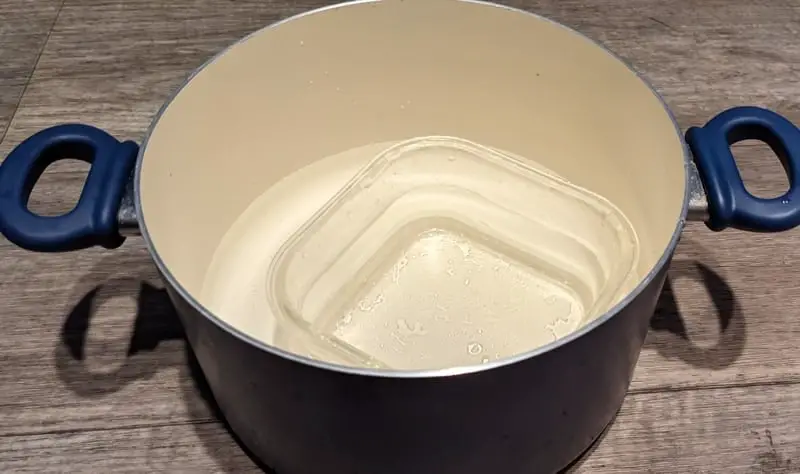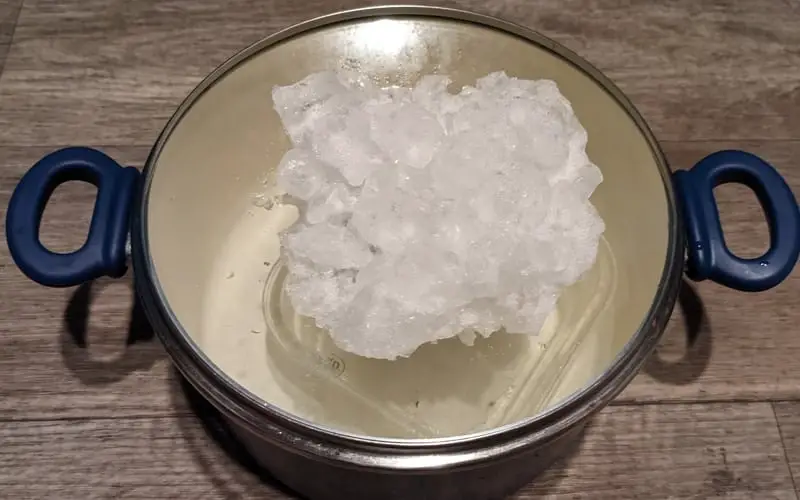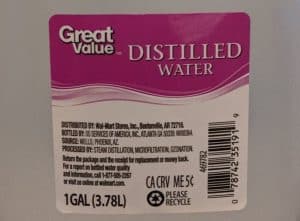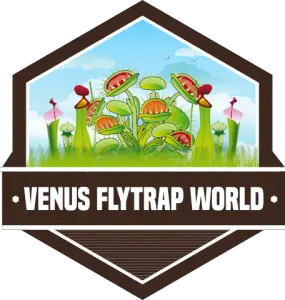Venus flytraps should only be watered with pure water sources such as distilled water, rainwater, or reverse osmosis water. Using the correct water type is critical to keeping your Venus flytraps alive.
Distilled water is safe for Venus flytraps as it does not contain harmful minerals. It is possible to make distilled water at home in small batches. Also, you can buy distilled water in most grocery stores and water/ice stores. Distilled water is suitable for all carnivorous plants.
In this article, I will teach you how to make distilled water for your plants. Your Venus flytraps will thrive with distilled water, as it is entirely safe for them.
How to Make Distilled Water for Carnivorous Plants
In this section, you will learn how to make distilled water at home. The process is simple, and it only requires a few items that you can find in most kitchens.
To get started you need to collect a few items:
- Tap water
- Ice
- Large pot with a lid
- Small pot or heatproof (Pyrex) container that fits inside the large pot
- A cooking range
Instructions
1.- Start by adding water to the large pot and placing it on the kitchen range. Then, grab the small container and place it inside the pot. The small container can float or sink in the large pot, but it should remain upright. Also, try to put the small container in the center of the large pot.

2.- Turn on the range to high and wait until the water starts to boil.
3.- Once the water starts boiling, use the lid to close the large pot. But, instead of placing the cover, as usual, place it upside-down. Finally, add a few blocks of ice on top of the lid.

4.- Collect distilled water: The boiling water will evaporate. The water vapor won’t escape the pot because the pot is closed. Then, the water will condense in the lid (thanks to the ice) and slowly drip into the small container.
The ice will melt, as the process continues, make sure to replace the ice as soon as it runs out.
The water that ends up in the small container is distilled water. The water left outside the small containers has not been purified yet. And, therefore, it is not safe for Venus flytraps.
You can purify any water with this distillation process. You can employ your tap water (regardless of the quality) or bottled water. In both cases, the distilled water you make will be pure (0 ppm – parts per million) and suitable for your carnivorous plants.
For a visual explanation, watch this video:
Even though making distilled water is not hard, it can be time-consuming. When it makes sense, you can make your own distilled water, but you can also buy it.
In the section below, I have listed several places where you can buy distilled water and their prices.
Where to Buy Distilled Water
Distilled water is available in many different establishments, and it tends to be relatively inexpensive. Generally, you can find them in grocery stores, pharmacies, or water and ice stores.
Grocery stores: Distilled water is sold at most grocery stores. They usually sell it in 1-gallon jugs that cost less than $1. Make sure to select the generic distilled water jug that contains only distilled water.

Online: You can buy distilled water in bulk from online grocery stores or even amazon.com. Here is a good option at a reasonable price .
.
Pharmacies: Pharmacies also sell distilled water often. Make sure to grab the water jugs that contain pure distilled water. If you are unsure about your choice, I recommend asking the staff. Since distilled water is often used for medical purposes, the staff should be able to point you in the right direction. Also, it should cost less than one to two dollars a gallon.
Water and ice stores: Stores that sell water exclusively tend to carry distilled water at a very affordable price. I buy distilled water for less than 50 cents a gallon. Bring your empty water jug to avoid buying one in store.
If you have a large water jug, you can take home many gallons of distilled water and do not have to worry about buying more in a long time.
Alternate Water Options for Venus Flytraps Besides Distilled Water
Besides distilled water, there are a few options that are also safe for Venus flytraps. Here is a list of some alternatives:
Reverse osmosis water:
RO water is entirely safe for Venus flytraps. However, finding RO water or making it can be challenging. Water stores often carry RO water, but most grocery stores do not.
Rainwater:
If you have access to rainwater, you can use it for your Venus flytraps.
Filtered water (in some cases) :
:
Filtered water is not always safe for Venus flytraps. Some filters remove enough components from the water, while others are not sufficient.
Filtered water from a ZeroWater filter is suitable for Venus flytraps as it delivers 0 ppm water. It is the only water filter I have tried that delivers 0 ppm water. Here is a link to check the specs and pricing of a ZeroWater pitcher filter on Amazon. The ZeroWater filter includes a TDS meter and one filter, so you will get your money back if you plan on buying distilled water for your Venus flytraps anyway.
filter on Amazon. The ZeroWater filter includes a TDS meter and one filter, so you will get your money back if you plan on buying distilled water for your Venus flytraps anyway.
Depending on the composition and quality of tap water, some might be suitable for Venus flytraps. Water must contain less than 50 ppm (parts per million) to be suitable for Venus flytraps. The ppm reading indicates the number of dissolved solids in the liquid.
Never employ tap water for your Venus flytraps unless you have tested it. You can measure the amount of total dissolved solids in the water with a TDS meter. TDS meters are cheap and easy to use. Here is a link to the one I use; you can check its current price on Amazon .
.
Bottled water:
Bottled water that contains less than 50 ppm is safe for Venus flytraps. I recently used a TDS meter to measure SmartWater and a generic brand of spring water. SmartWater turned out to have an appropriate ppm level (<30 ppm) for carnivorous plants. The spring water had over 120 ppm, which is too high for Venus flytraps. However, some brands might be suitable.
How to Water a Venus Flytrap
Making or getting the proper water for Venus flytraps is just the first step. Then, you must water your plant right and consistently to keep it healthy.
How much water do Venus Fly Traps need?
Venus Fly Traps require substantial amounts of water. Water the soil often until the ground is moist but not flooded. Never let the soil dry out completely, once the soil is slightly less humid, water again?
How do you Water Venus Fly Traps perfectly every single time?
Consider employing the water tray method to ensure precise and consistent watering. Place your plant’s pot in a tray of at least 1 inch in depth. Fill up the tray with water to about 1-2 inches in depth. Let the plant consume the water over time. Once the tray dries us, refill the tray repeating the process.
With this method you are watering your plant from the bottom, promoting root growth and preventing under and over watering issues.
You can find more information on the water tray method here.
Which water to use for Venus Fly Traps?
Distilled water, reverse osmosis water, and rainwater are safe options. Only employ tap water, filtered water, or bottled water after testing its mineral content and if it contains less than 50 parts per million (ppm).
How should you adjust the water frequency for Venus fly Traps?
Venus flytraps tend to consume a lot less water in the winter, especially when they are dormant.
What are the signs of over watering?
White mold or algae are signs of overwatering.
What are the signs of under watering?
Droopy and dried up leaves
For more information on watering your Venus flytrap, make sure to read this guide: Venus Flytrap Watering Instruction Guide . It includes all the details about the watering process. Also, it gives you instructions on how to save your plant if you have used the wrong water.
. It includes all the details about the watering process. Also, it gives you instructions on how to save your plant if you have used the wrong water.
Venus Fly Trap Care
With this article, you learned how to make distilled water for your carnivorous plants. But, there is a lot to learn to keep your plants alive and healthy. Read the overview below and this guide to learn all you need to know about growing Venus flytraps: Ultimate Venus Flytrap Care Guide. And for indoor growing: Venus Flytrap Indoor Care Guide .
.
Light: Optimally they should receive 12 hours of sunlight, and the minimum is 6 hours of light. The light source might be natural light or artificial lighting (plant lights)
Water : Venus flytraps must be watered with pure water only, such as rainwater, distilled water, and reverse osmosis water. Tap water and bottled water kill carnivorous plants.
: Venus flytraps must be watered with pure water only, such as rainwater, distilled water, and reverse osmosis water. Tap water and bottled water kill carnivorous plants.
The soil of the plant must always remain moist. Always keep the ground humid, but do not flood. Venus flytraps do not grow in swamps.
Soil: Employ nutrient-free soil for carnivorous plants. Never employ enriched soil, full of fertilizers. This article covers many soil options for Venus flytraps.
covers many soil options for Venus flytraps.
Feeding: Venus flytraps do not need to capture insects to survive, but they benefit from them greatly. Place Venus flytraps outdoors, and they will have plenty of access to food. Also, consider feeding your plant to provide extra nutrients.
Fertilizers: Do not fertilize Venus flytraps. The chemicals in the fertilizers can hurt the plant
Flowers: After reaching maturity, Venus flytraps start producing flowers every spring. Skipping it allows for further growth and development.
Dormancy: Venus flytraps must undergo a dormancy period for 2-3 months during the winter. Ensure your plant will experience this resting period by placing them in a cold location. For example, outdoors, in a cold garage, or porch.
Recommended Products for Growing Carnivorous Plants
Finding the best pots, lights, and soil for carnivorous plants is difficult. I have grown carnivorous plants for over 5 years, and these are the products I use. The links will take you to Amazon to view the prices and full specs:
- Carnivorous Plant Soil
- Carnivorous plant soil: https://amzn.to/422yLZa

- Carnivorous plant soil: https://amzn.to/422yLZa
- Artificial Lighting
- Small plant light for 1-2 plants: https://amzn.to/3oQsmSj

- T8 LED light fixture for multiple plants (6500k Cool White): https://amzn.to/3uWoeh2

- Small plant light for 1-2 plants: https://amzn.to/3oQsmSj
- Pots and Miscellaneus
- Nursery pots for single plants: https://amzn.to/3oL8YGq

- Nursery pots for single plants: https://amzn.to/3oL8YGq
- TDS meter to measure water quality: https://amzn.to/3g8VKLI

- Dried crickets to feed carnivorous plants: https://amzn.to/34QEnKv

